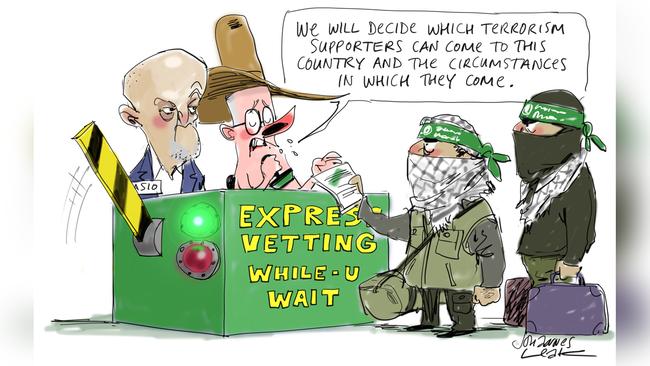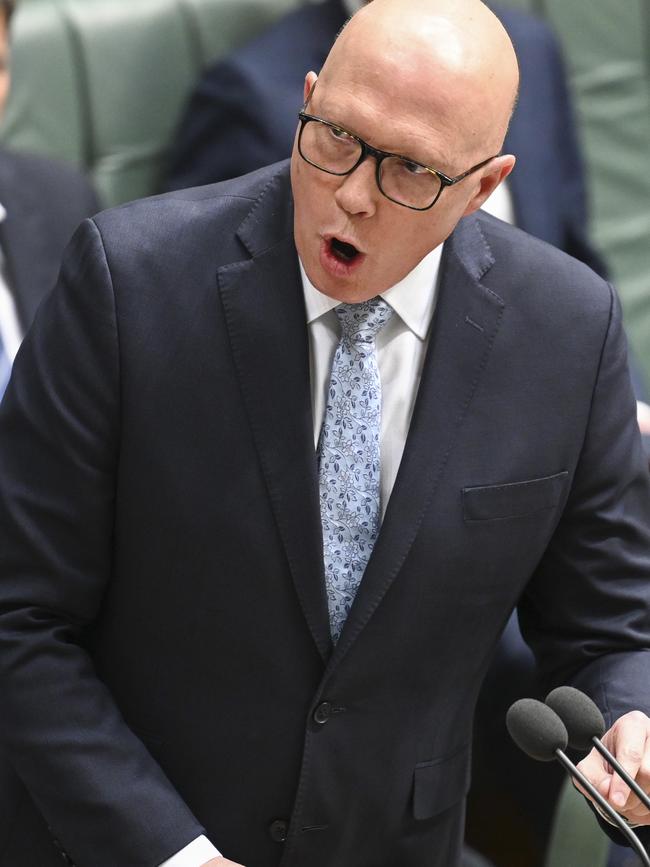
Burgess is a smart public servant, defending his own organisation and not seeking to speak for government or other parts of the bureaucracy.
When asked about Gazans applying for visas, Burgess said: “Security checks are critically important. There are processes in place and I can assure your audience that when they get referred to ASIO we deal with them effectively.”
Burgess then admits that not all such references are timely but then stresses “once we become aware of them, we are able to do the assessments and deal with them effectively”.
He was pressed to give assurances that Gazans who received visas had appropriate security checks but he said only that “there is a visa process in place” – something ASIO does not control.
The only assurance Burgess offers is that if “a criteria hit” is triggered by the visa process “they are referred to my organisation and ASIO does its thing”. This is hardly an endorsement of the processes applied to visas from Gaza. The phrase “once we become aware of them” suggests ASIO was forced to do some assessments after the fact.
In question time on Thursday Prime Minister Anthony Albanese refused to deal with the detail of the visas. “We, of course, take the same advice from the same security agencies, even the same security personnel as the former government did.”

But every crisis is different. Australian officials had no opportunity after the Hamas attacks last October to conduct anything but the most cursory security checks.
We do not know if officials were able to consult with Israeli defence and intelligence agencies – obviously by far the best-informed entities about Hamas sympathisers in Gaza.
Data released on Wednesday by the Department of Home Affairs backs up the suspicion that security checks were inadequate. Two sets of figures were released, one covering all visa approvals (2922 – 29 per cent) and rejections (7111 – 70.8 per cent) from Gaza since October 7, 2023.
A subset of that is what happened in the past three months. The picture changes dramatically: only 236 of 2733 visa applications were approved, that is 8.6 per cent. Fully 91.4 per cent of visa applications were rejected.
The obvious question is: Why is there a significant jump in visa rejections? That would be ASIO doing its thing.
Home Affairs also noted that 43 visas for people travelling from Gaza had been cancelled. A cancelled visa implies that the visa shouldn’t have been issued in the first place.
The dramatic recent increase in visa refusals tells me the earlier stages of assessing applications were not as thorough as they should have been. That’s not a criticism of officials, it’s just a reflection of the chaotic circumstances they were working under.
Rather than defending a process that clearly looks flawed, the government should address the substantial risk that some people got visas that a more thorough security assessment would have blocked.
Note also that Burgess works to a specific remit in the counter-terrorism area. It’s not ASIO’s function to assess whether people will be good citizens. The organisation’s concern is to stop violent extremism.
This explains Burgess’s rather odd comment that if individuals have “just rhetorical support” for Hamas “then we don’t have a problem”. Burgess is concentrating on ASIO’s role.
It’s the government’s job to set wider rules about what might constitute a fit and proper person to enter Australia. We know there is substantial support for Hamas in Gaza.
A June 2024 opinion poll by the Palestinian Centre for Policy and Survey Research found 40 per cent of respondents in Gaza and the West Bank were in favour of Hamas. Fifty-seven per cent of Gazans said that Hamas’s attack on Israel on October 7 was the right decision.
It may be possible for an individual to hold such views and not personally want to engage in violence, in which case ASIO may not “have a problem”. But it is surely a legitimate question to ask if such individuals are the right people to bring to Australia.
Even when a “criteria hit” – a red flag of some type – brings a person to ASIO’s attention, an organisational concern only about the potential for violent extremism allows a lot of people to pass this not very stringent test.
Mike Burgess’s careful use of language deserted him on one issue: anti-Semitism. On August 5, when ASIO lifted its national terrorism threat level from “possible to probable”, Burgess said “there’s plenty of anti-Semitism, but there’s plenty of Islamophobia at the same time. It’s kind of, almost, equal treatment”.
Last Sunday the emphasis had changed: “There is no doubt after the 7th of October there was far more anti-Semitism in the country than Islamophobia, but we have both today. I don’t think it should be considered a race of which one is more important.”
Understanding where the real threat comes from would add some precision to a debate that too often denies the realities of our national direction.







On security checks of refugees from Gaza a lot of weight is being put on a handful of sentences uttered by ASIO head Mike Burgess in his Sunday television interview.